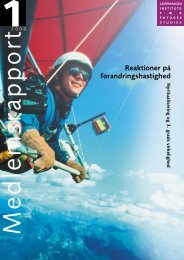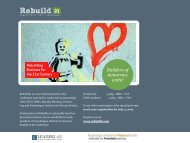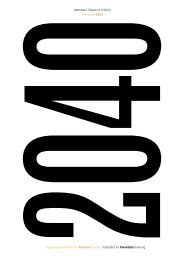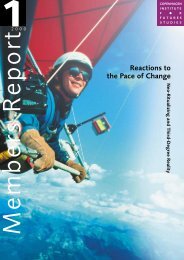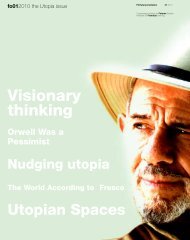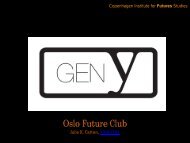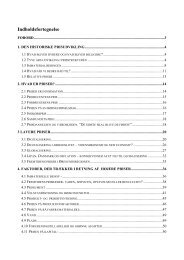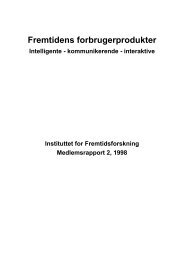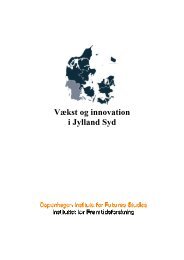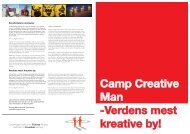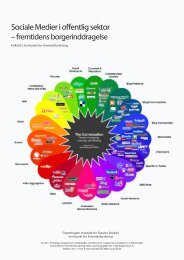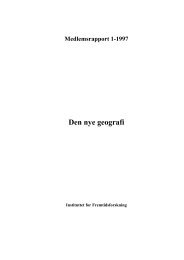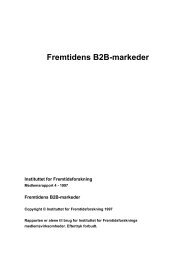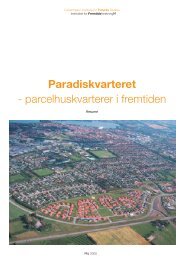Branding.
Branding.
Branding.
You also want an ePaper? Increase the reach of your titles
YUMPU automatically turns print PDFs into web optimized ePapers that Google loves.
31<br />
tools, it has become possible to organise the workday more sensibly and e.g.<br />
work three concentrated days and take the next four days off. Weber's bureaucracy<br />
ideals are brought out, polished and served in a lighter version.<br />
The basic idea is still Weber's classical one: there has to be rational and measurable<br />
criteria for work and advancement. Exams have once more become<br />
the criteria for getting a position after a period where companies sought<br />
people that matched the company spirit, culture and values. The tasks have<br />
become increasingly specified and are performed on the basis of formalised<br />
rules and guidelines. All are treated equal. That is the most just and the most<br />
effective - and self-management is not a subject that is being discussed.<br />
Another consequence of the rational wave is division of work.<br />
Unemployment isn't an optimal condition for the society, especially when<br />
many are overworked. Hence, advanced calculations are made for how much<br />
each has to work through his or her life. There are obviously some rules to<br />
prevent you from depositing all your work in your most unproductive years.<br />
It is e.g. possible to counterbalance overtime, but not to save up 'undertime'.<br />
Health expenses are reduced this way, since stress used to be a common<br />
cause of death.<br />
<strong>Branding</strong> in 'The Logic of Great Solutions'<br />
The years around 1990-2005 were dedicated to soft values and the big stories.<br />
In the years leading up to 2013, a new movement takes place, and out of the<br />
rubble of the dream society, new communities are growing. The focus is on<br />
rational solutions for rational people. Stress has long since reached the top of<br />
WHO's list of the greatest health dangers, and this has necessitated functional<br />
solutions for the complexity-burdened human being. The technological development<br />
is still the driving force.<br />
<strong>Branding</strong> as internal company tool<br />
Corporate <strong>Branding</strong> thrives best when the externally emotional expressivity<br />
is toned down in favour of the company as a meaningful system for the<br />
employees. <strong>Branding</strong> directed internally contributes to create a distinction<br />
between 'us' and 'them'. It creates a sense of belonging and is increasingly<br />
used as a pedagogical tool for supporting the feeling of community. It is of<br />
course expected that words are followed by action. A happy employee is an<br />
innovative and productive employee. Employee care thus increasingly<br />
extends to include the employee's family, which is involved more in the company's<br />
life - just as the company is involved in the families' lives.<br />
Holism is a key word, and the philosophy of CSR (see page 7) is increasingly<br />
incorporated in practice. It is e.g. not uncommon for companies to<br />
provide financial support for family therapy if there are problems. In this<br />
way, the company plays an increasing role in the civil society, and responsibility<br />
for the employee in his or her entire life situation is becoming common,<br />
as per the traditional Japanese model. Markets in growth are the markets<br />
for safety, stability and comfort, with solutions as the central parameter.<br />
External Corporate <strong>Branding</strong> becomes obsolete<br />
Corporate <strong>Branding</strong> increasingly becomes obsolete in the public spaces - at<br />
least where it refers to the company that has created the product and hence<br />
guarantees the quality and communicates comfort and recognition. Digital<br />
agents can effectively scan the market and find the products that best fit the<br />
price. Consumer trust has thus moved from trust in brands to trust in the<br />
digital agent. The agent is seen as an extension of our self. We thus increasingly<br />
reject marketed emotionality and staging of the individual's life situation.<br />
Digital agents may be analytical, but they can neither feel nor act intuitively.<br />
LUNDBECK IN 'THE LOGIC OF<br />
GREAT SOLUTIONS' 2013<br />
Lundbeck is still a quoted company,<br />
but today the state owns the<br />
majority of the stock because of a<br />
desire to support and guide promising<br />
private research. We now<br />
have a politician as the chairman<br />
of our board of directors. We have<br />
entered into strategic alliances<br />
with companies that have pharmaceutical<br />
drugs with supplementing<br />
indicators on our products -<br />
you can thus buy a 'three in one'<br />
package that deals with all symptoms<br />
and side effects. The target<br />
group is still doctors and specialists,<br />
who come to multi-conferences<br />
where they can also meet<br />
Lundbeck's former competitors.<br />
The big pharmaceutical companies<br />
now work together to combat<br />
competition on generics. At the<br />
same time, they divide the market<br />
between them and thus create<br />
therapy monopolies.<br />
Lundbeck has chosen to purchase<br />
smaller research-based<br />
companies, partly to keep on growing,<br />
partly to expand the product<br />
portfolio of partial solutions to<br />
symptoms. Our branding activities<br />
still have a corporate profile, but<br />
more in relation to creating alliances<br />
with global representation.<br />
Lundbeck has been awarded the<br />
most rational state-within-the-state



